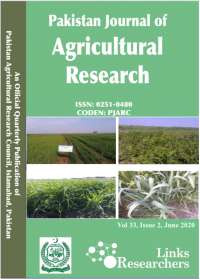Apricot Shot Hole Disease Prevalence in the Markets of Federal Capital Territory, Pakistan
Apricot Shot Hole Disease Prevalence in the Markets of Federal Capital Territory, Pakistan
Humayun Saleem1, Faisal Sohail Fateh2*, Zia-Ur-Rehman1 and Muhammad Abu Bakar Siddique1
ABSTRACT
Apricot (Prunus armeniaca L.) is a continental deciduous plant with cold winters that can withstand temperatures as low as -30 ° C. The apricot has been used as a treatment for various diseases in Folk medicines. Shot hole which is a fungal disease caused by Wilsonomyces carpophilus is one of the diseases that target apricot. The purpose of the current study was to record the prevalence of shot hole disease on Islamabad’s Federal Capital Territory markets. The frequency and severity of shot hole disease was estimated from market random samples, and later the index was measured. The results showed that in all markets with varying degrees of disease incidence, frequency and disease index the prevalence of shot hole disease was 100 per cent. It was concluded that the markets near poor colonies are merely selling cheap fruits and they are not concerned with the diseased fruits.
To share on other social networks, click on any share button. What are these?







